University Assignment: Global Business Environment Analysis for SASOL
VerifiedAdded on 2023/06/04
|13
|4320
|228
Report
AI Summary
This report provides a comprehensive analysis of the global business environment, using SASOL as a case study. It begins with an introduction to globalization, followed by a PESTLE analysis to examine external influences on SASOL. The report then explores the key driving factors of globalization, evaluates the impact of digital technology, and assesses the challenges and complexities it brings to SASOL. Recommendations are provided to overcome these challenges. Part 2 delves into SASOL's structure, culture, and governance using McKinsey's 7S model, and evaluates the influence of global operations and adaptations. The report applies Hofstede's cultural dimensions, examines ethical and sustainable factors, and assesses strategic expansion routes for the company. The report concludes with a summary of findings and provides recommendations for SASOL to navigate the global business environment effectively.
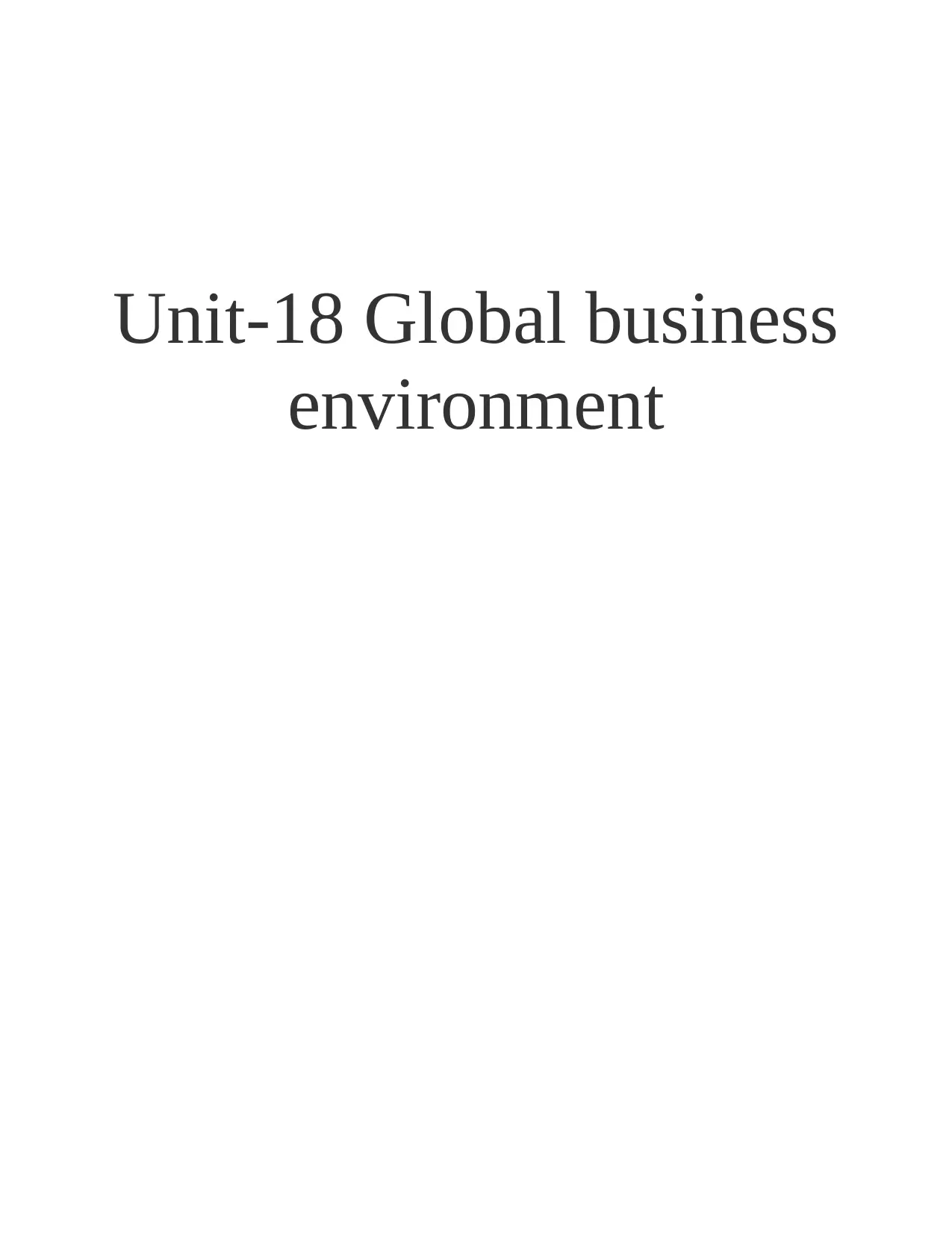
Unit-18 Global business
environment
environment
Paraphrase This Document
Need a fresh take? Get an instant paraphrase of this document with our AI Paraphraser
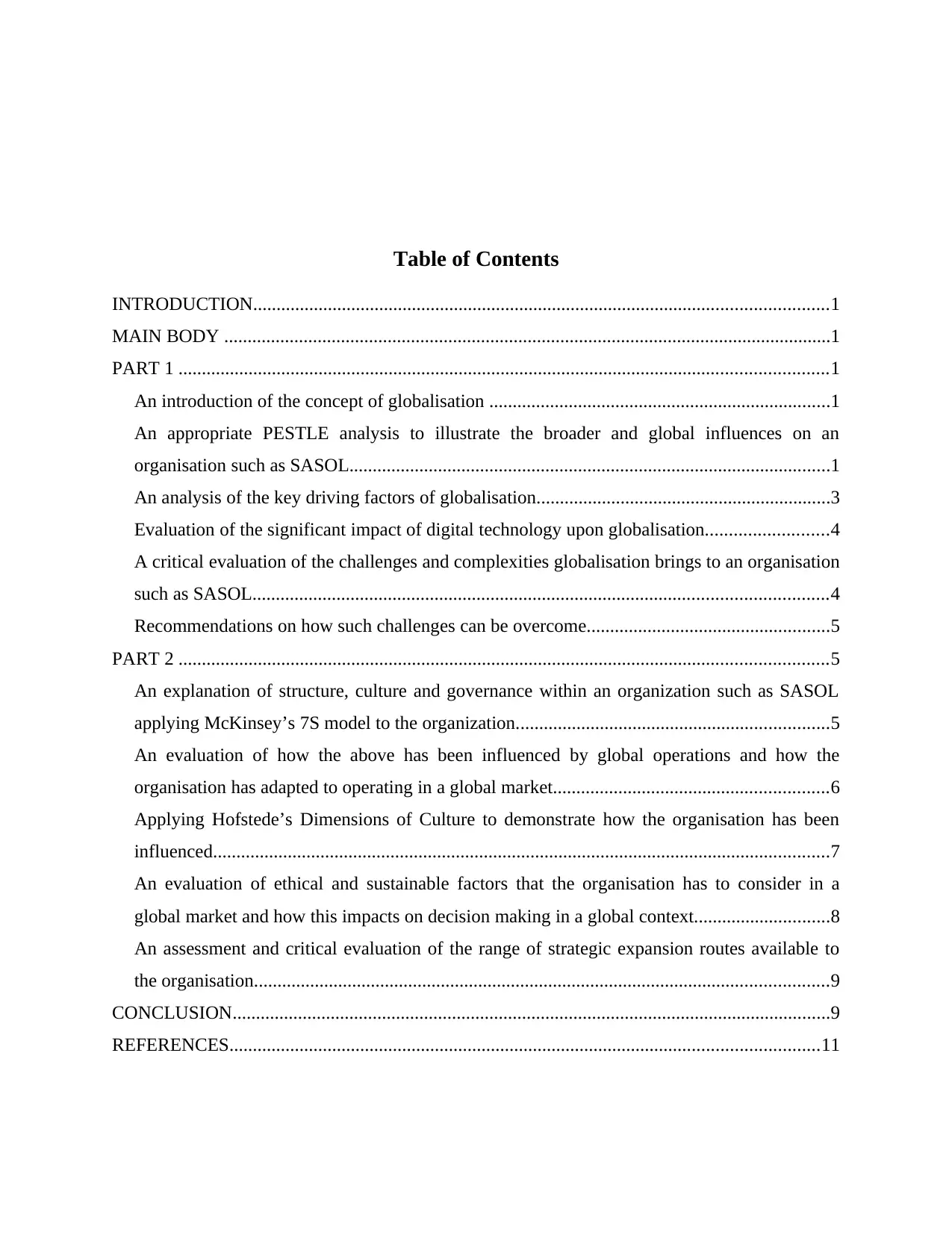
Table of Contents
INTRODUCTION...........................................................................................................................1
MAIN BODY ..................................................................................................................................1
PART 1 ...........................................................................................................................................1
An introduction of the concept of globalisation .........................................................................1
An appropriate PESTLE analysis to illustrate the broader and global influences on an
organisation such as SASOL.......................................................................................................1
An analysis of the key driving factors of globalisation...............................................................3
Evaluation of the significant impact of digital technology upon globalisation..........................4
A critical evaluation of the challenges and complexities globalisation brings to an organisation
such as SASOL...........................................................................................................................4
Recommendations on how such challenges can be overcome....................................................5
PART 2 ...........................................................................................................................................5
An explanation of structure, culture and governance within an organization such as SASOL
applying McKinsey’s 7S model to the organization...................................................................5
An evaluation of how the above has been influenced by global operations and how the
organisation has adapted to operating in a global market...........................................................6
Applying Hofstede’s Dimensions of Culture to demonstrate how the organisation has been
influenced....................................................................................................................................7
An evaluation of ethical and sustainable factors that the organisation has to consider in a
global market and how this impacts on decision making in a global context.............................8
An assessment and critical evaluation of the range of strategic expansion routes available to
the organisation...........................................................................................................................9
CONCLUSION................................................................................................................................9
REFERENCES..............................................................................................................................11
INTRODUCTION...........................................................................................................................1
MAIN BODY ..................................................................................................................................1
PART 1 ...........................................................................................................................................1
An introduction of the concept of globalisation .........................................................................1
An appropriate PESTLE analysis to illustrate the broader and global influences on an
organisation such as SASOL.......................................................................................................1
An analysis of the key driving factors of globalisation...............................................................3
Evaluation of the significant impact of digital technology upon globalisation..........................4
A critical evaluation of the challenges and complexities globalisation brings to an organisation
such as SASOL...........................................................................................................................4
Recommendations on how such challenges can be overcome....................................................5
PART 2 ...........................................................................................................................................5
An explanation of structure, culture and governance within an organization such as SASOL
applying McKinsey’s 7S model to the organization...................................................................5
An evaluation of how the above has been influenced by global operations and how the
organisation has adapted to operating in a global market...........................................................6
Applying Hofstede’s Dimensions of Culture to demonstrate how the organisation has been
influenced....................................................................................................................................7
An evaluation of ethical and sustainable factors that the organisation has to consider in a
global market and how this impacts on decision making in a global context.............................8
An assessment and critical evaluation of the range of strategic expansion routes available to
the organisation...........................................................................................................................9
CONCLUSION................................................................................................................................9
REFERENCES..............................................................................................................................11
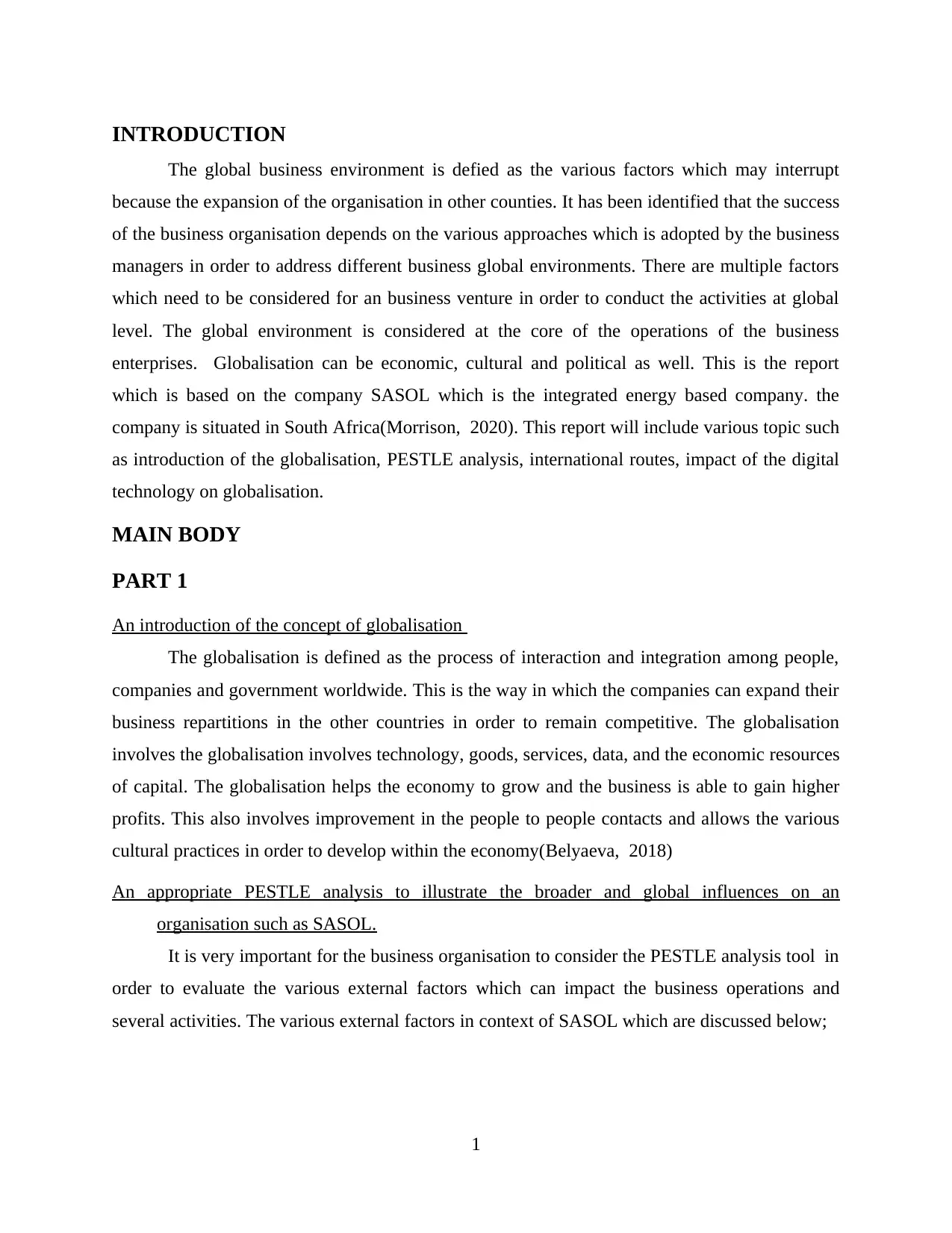
INTRODUCTION
The global business environment is defied as the various factors which may interrupt
because the expansion of the organisation in other counties. It has been identified that the success
of the business organisation depends on the various approaches which is adopted by the business
managers in order to address different business global environments. There are multiple factors
which need to be considered for an business venture in order to conduct the activities at global
level. The global environment is considered at the core of the operations of the business
enterprises. Globalisation can be economic, cultural and political as well. This is the report
which is based on the company SASOL which is the integrated energy based company. the
company is situated in South Africa(Morrison, 2020). This report will include various topic such
as introduction of the globalisation, PESTLE analysis, international routes, impact of the digital
technology on globalisation.
MAIN BODY
PART 1
An introduction of the concept of globalisation
The globalisation is defined as the process of interaction and integration among people,
companies and government worldwide. This is the way in which the companies can expand their
business repartitions in the other countries in order to remain competitive. The globalisation
involves the globalisation involves technology, goods, services, data, and the economic resources
of capital. The globalisation helps the economy to grow and the business is able to gain higher
profits. This also involves improvement in the people to people contacts and allows the various
cultural practices in order to develop within the economy(Belyaeva, 2018)
An appropriate PESTLE analysis to illustrate the broader and global influences on an
organisation such as SASOL.
It is very important for the business organisation to consider the PESTLE analysis tool in
order to evaluate the various external factors which can impact the business operations and
several activities. The various external factors in context of SASOL which are discussed below;
1
The global business environment is defied as the various factors which may interrupt
because the expansion of the organisation in other counties. It has been identified that the success
of the business organisation depends on the various approaches which is adopted by the business
managers in order to address different business global environments. There are multiple factors
which need to be considered for an business venture in order to conduct the activities at global
level. The global environment is considered at the core of the operations of the business
enterprises. Globalisation can be economic, cultural and political as well. This is the report
which is based on the company SASOL which is the integrated energy based company. the
company is situated in South Africa(Morrison, 2020). This report will include various topic such
as introduction of the globalisation, PESTLE analysis, international routes, impact of the digital
technology on globalisation.
MAIN BODY
PART 1
An introduction of the concept of globalisation
The globalisation is defined as the process of interaction and integration among people,
companies and government worldwide. This is the way in which the companies can expand their
business repartitions in the other countries in order to remain competitive. The globalisation
involves the globalisation involves technology, goods, services, data, and the economic resources
of capital. The globalisation helps the economy to grow and the business is able to gain higher
profits. This also involves improvement in the people to people contacts and allows the various
cultural practices in order to develop within the economy(Belyaeva, 2018)
An appropriate PESTLE analysis to illustrate the broader and global influences on an
organisation such as SASOL.
It is very important for the business organisation to consider the PESTLE analysis tool in
order to evaluate the various external factors which can impact the business operations and
several activities. The various external factors in context of SASOL which are discussed below;
1
⊘ This is a preview!⊘
Do you want full access?
Subscribe today to unlock all pages.

Trusted by 1+ million students worldwide
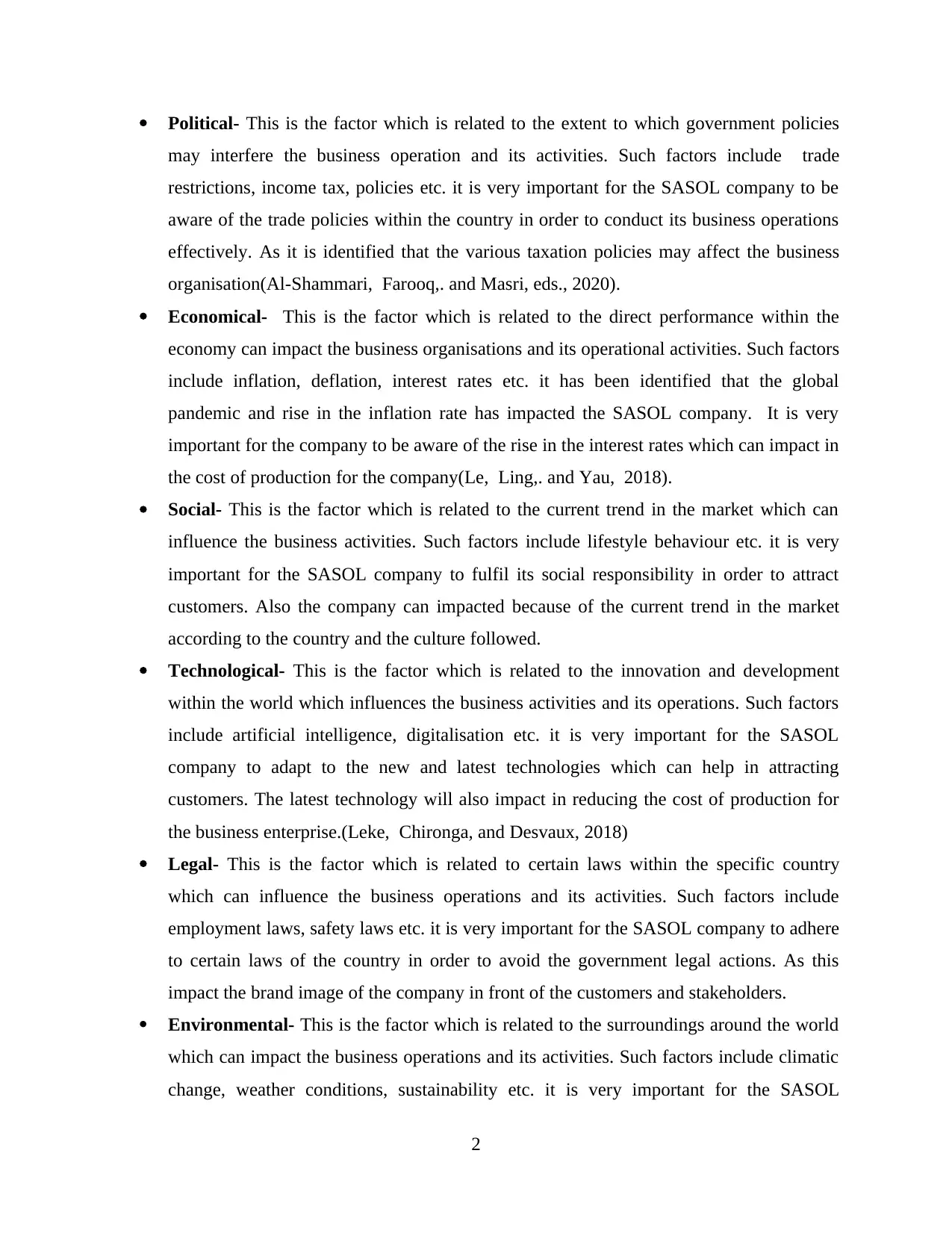
Political- This is the factor which is related to the extent to which government policies
may interfere the business operation and its activities. Such factors include trade
restrictions, income tax, policies etc. it is very important for the SASOL company to be
aware of the trade policies within the country in order to conduct its business operations
effectively. As it is identified that the various taxation policies may affect the business
organisation(Al-Shammari, Farooq,. and Masri, eds., 2020).
Economical- This is the factor which is related to the direct performance within the
economy can impact the business organisations and its operational activities. Such factors
include inflation, deflation, interest rates etc. it has been identified that the global
pandemic and rise in the inflation rate has impacted the SASOL company. It is very
important for the company to be aware of the rise in the interest rates which can impact in
the cost of production for the company(Le, Ling,. and Yau, 2018).
Social- This is the factor which is related to the current trend in the market which can
influence the business activities. Such factors include lifestyle behaviour etc. it is very
important for the SASOL company to fulfil its social responsibility in order to attract
customers. Also the company can impacted because of the current trend in the market
according to the country and the culture followed.
Technological- This is the factor which is related to the innovation and development
within the world which influences the business activities and its operations. Such factors
include artificial intelligence, digitalisation etc. it is very important for the SASOL
company to adapt to the new and latest technologies which can help in attracting
customers. The latest technology will also impact in reducing the cost of production for
the business enterprise.(Leke, Chironga, and Desvaux, 2018)
Legal- This is the factor which is related to certain laws within the specific country
which can influence the business operations and its activities. Such factors include
employment laws, safety laws etc. it is very important for the SASOL company to adhere
to certain laws of the country in order to avoid the government legal actions. As this
impact the brand image of the company in front of the customers and stakeholders.
Environmental- This is the factor which is related to the surroundings around the world
which can impact the business operations and its activities. Such factors include climatic
change, weather conditions, sustainability etc. it is very important for the SASOL
2
may interfere the business operation and its activities. Such factors include trade
restrictions, income tax, policies etc. it is very important for the SASOL company to be
aware of the trade policies within the country in order to conduct its business operations
effectively. As it is identified that the various taxation policies may affect the business
organisation(Al-Shammari, Farooq,. and Masri, eds., 2020).
Economical- This is the factor which is related to the direct performance within the
economy can impact the business organisations and its operational activities. Such factors
include inflation, deflation, interest rates etc. it has been identified that the global
pandemic and rise in the inflation rate has impacted the SASOL company. It is very
important for the company to be aware of the rise in the interest rates which can impact in
the cost of production for the company(Le, Ling,. and Yau, 2018).
Social- This is the factor which is related to the current trend in the market which can
influence the business activities. Such factors include lifestyle behaviour etc. it is very
important for the SASOL company to fulfil its social responsibility in order to attract
customers. Also the company can impacted because of the current trend in the market
according to the country and the culture followed.
Technological- This is the factor which is related to the innovation and development
within the world which influences the business activities and its operations. Such factors
include artificial intelligence, digitalisation etc. it is very important for the SASOL
company to adapt to the new and latest technologies which can help in attracting
customers. The latest technology will also impact in reducing the cost of production for
the business enterprise.(Leke, Chironga, and Desvaux, 2018)
Legal- This is the factor which is related to certain laws within the specific country
which can influence the business operations and its activities. Such factors include
employment laws, safety laws etc. it is very important for the SASOL company to adhere
to certain laws of the country in order to avoid the government legal actions. As this
impact the brand image of the company in front of the customers and stakeholders.
Environmental- This is the factor which is related to the surroundings around the world
which can impact the business operations and its activities. Such factors include climatic
change, weather conditions, sustainability etc. it is very important for the SASOL
2
Paraphrase This Document
Need a fresh take? Get an instant paraphrase of this document with our AI Paraphraser
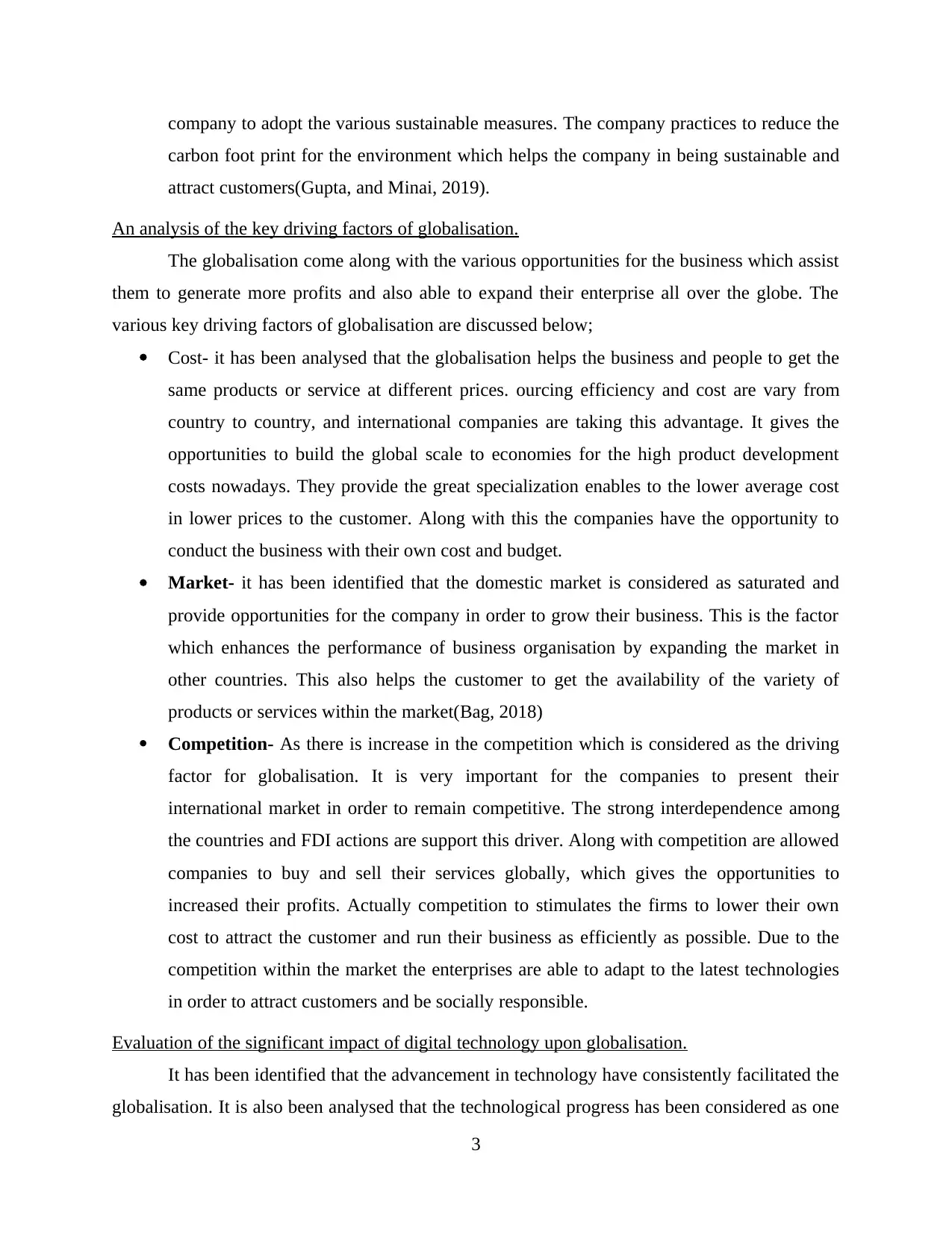
company to adopt the various sustainable measures. The company practices to reduce the
carbon foot print for the environment which helps the company in being sustainable and
attract customers(Gupta, and Minai, 2019).
An analysis of the key driving factors of globalisation.
The globalisation come along with the various opportunities for the business which assist
them to generate more profits and also able to expand their enterprise all over the globe. The
various key driving factors of globalisation are discussed below;
Cost- it has been analysed that the globalisation helps the business and people to get the
same products or service at different prices. ourcing efficiency and cost are vary from
country to country, and international companies are taking this advantage. It gives the
opportunities to build the global scale to economies for the high product development
costs nowadays. They provide the great specialization enables to the lower average cost
in lower prices to the customer. Along with this the companies have the opportunity to
conduct the business with their own cost and budget.
Market- it has been identified that the domestic market is considered as saturated and
provide opportunities for the company in order to grow their business. This is the factor
which enhances the performance of business organisation by expanding the market in
other countries. This also helps the customer to get the availability of the variety of
products or services within the market(Bag, 2018)
Competition- As there is increase in the competition which is considered as the driving
factor for globalisation. It is very important for the companies to present their
international market in order to remain competitive. The strong interdependence among
the countries and FDI actions are support this driver. Along with competition are allowed
companies to buy and sell their services globally, which gives the opportunities to
increased their profits. Actually competition to stimulates the firms to lower their own
cost to attract the customer and run their business as efficiently as possible. Due to the
competition within the market the enterprises are able to adapt to the latest technologies
in order to attract customers and be socially responsible.
Evaluation of the significant impact of digital technology upon globalisation.
It has been identified that the advancement in technology have consistently facilitated the
globalisation. It is also been analysed that the technological progress has been considered as one
3
carbon foot print for the environment which helps the company in being sustainable and
attract customers(Gupta, and Minai, 2019).
An analysis of the key driving factors of globalisation.
The globalisation come along with the various opportunities for the business which assist
them to generate more profits and also able to expand their enterprise all over the globe. The
various key driving factors of globalisation are discussed below;
Cost- it has been analysed that the globalisation helps the business and people to get the
same products or service at different prices. ourcing efficiency and cost are vary from
country to country, and international companies are taking this advantage. It gives the
opportunities to build the global scale to economies for the high product development
costs nowadays. They provide the great specialization enables to the lower average cost
in lower prices to the customer. Along with this the companies have the opportunity to
conduct the business with their own cost and budget.
Market- it has been identified that the domestic market is considered as saturated and
provide opportunities for the company in order to grow their business. This is the factor
which enhances the performance of business organisation by expanding the market in
other countries. This also helps the customer to get the availability of the variety of
products or services within the market(Bag, 2018)
Competition- As there is increase in the competition which is considered as the driving
factor for globalisation. It is very important for the companies to present their
international market in order to remain competitive. The strong interdependence among
the countries and FDI actions are support this driver. Along with competition are allowed
companies to buy and sell their services globally, which gives the opportunities to
increased their profits. Actually competition to stimulates the firms to lower their own
cost to attract the customer and run their business as efficiently as possible. Due to the
competition within the market the enterprises are able to adapt to the latest technologies
in order to attract customers and be socially responsible.
Evaluation of the significant impact of digital technology upon globalisation.
It has been identified that the advancement in technology have consistently facilitated the
globalisation. It is also been analysed that the technological progress has been considered as one
3
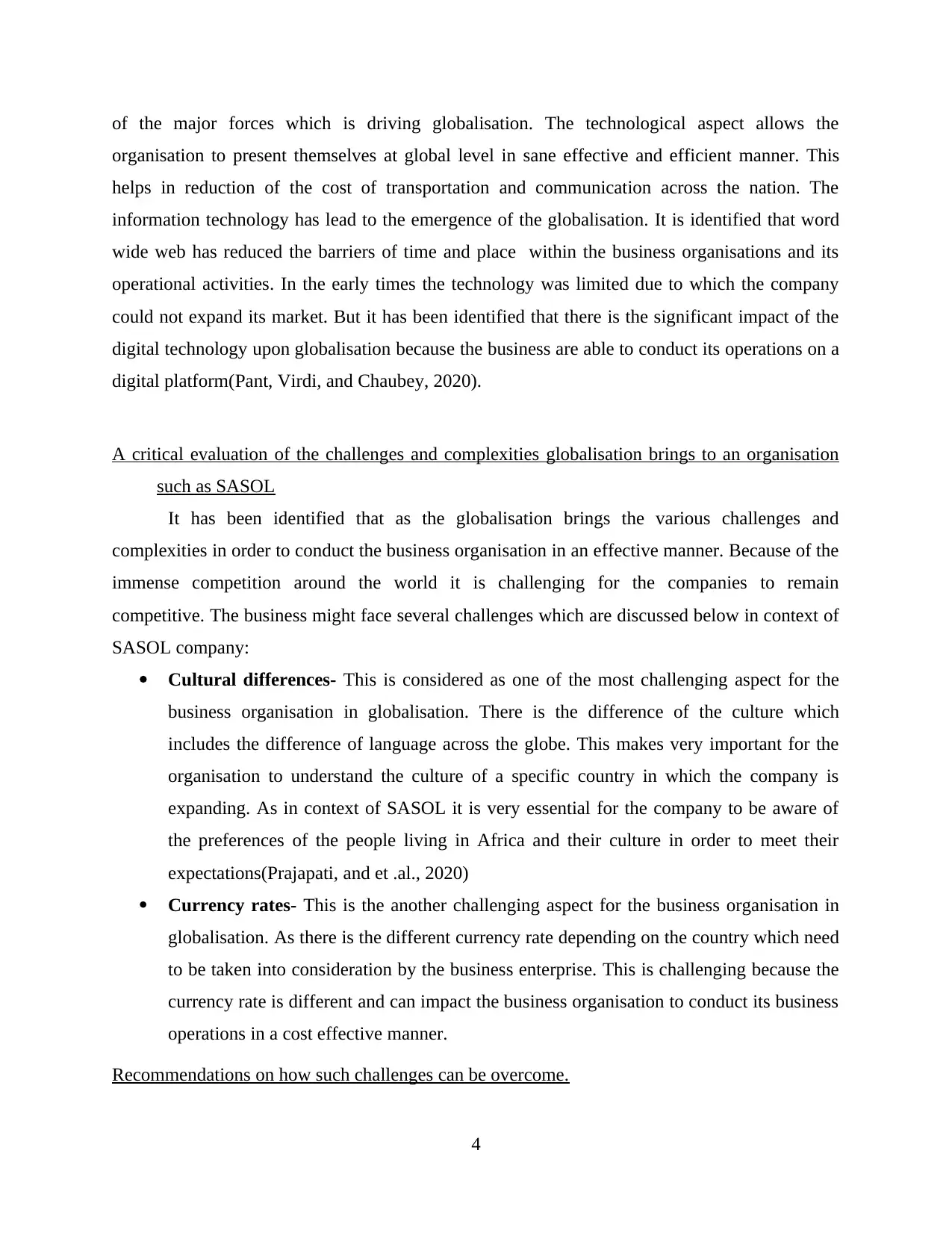
of the major forces which is driving globalisation. The technological aspect allows the
organisation to present themselves at global level in sane effective and efficient manner. This
helps in reduction of the cost of transportation and communication across the nation. The
information technology has lead to the emergence of the globalisation. It is identified that word
wide web has reduced the barriers of time and place within the business organisations and its
operational activities. In the early times the technology was limited due to which the company
could not expand its market. But it has been identified that there is the significant impact of the
digital technology upon globalisation because the business are able to conduct its operations on a
digital platform(Pant, Virdi, and Chaubey, 2020).
A critical evaluation of the challenges and complexities globalisation brings to an organisation
such as SASOL
It has been identified that as the globalisation brings the various challenges and
complexities in order to conduct the business organisation in an effective manner. Because of the
immense competition around the world it is challenging for the companies to remain
competitive. The business might face several challenges which are discussed below in context of
SASOL company:
Cultural differences- This is considered as one of the most challenging aspect for the
business organisation in globalisation. There is the difference of the culture which
includes the difference of language across the globe. This makes very important for the
organisation to understand the culture of a specific country in which the company is
expanding. As in context of SASOL it is very essential for the company to be aware of
the preferences of the people living in Africa and their culture in order to meet their
expectations(Prajapati, and et .al., 2020)
Currency rates- This is the another challenging aspect for the business organisation in
globalisation. As there is the different currency rate depending on the country which need
to be taken into consideration by the business enterprise. This is challenging because the
currency rate is different and can impact the business organisation to conduct its business
operations in a cost effective manner.
Recommendations on how such challenges can be overcome.
4
organisation to present themselves at global level in sane effective and efficient manner. This
helps in reduction of the cost of transportation and communication across the nation. The
information technology has lead to the emergence of the globalisation. It is identified that word
wide web has reduced the barriers of time and place within the business organisations and its
operational activities. In the early times the technology was limited due to which the company
could not expand its market. But it has been identified that there is the significant impact of the
digital technology upon globalisation because the business are able to conduct its operations on a
digital platform(Pant, Virdi, and Chaubey, 2020).
A critical evaluation of the challenges and complexities globalisation brings to an organisation
such as SASOL
It has been identified that as the globalisation brings the various challenges and
complexities in order to conduct the business organisation in an effective manner. Because of the
immense competition around the world it is challenging for the companies to remain
competitive. The business might face several challenges which are discussed below in context of
SASOL company:
Cultural differences- This is considered as one of the most challenging aspect for the
business organisation in globalisation. There is the difference of the culture which
includes the difference of language across the globe. This makes very important for the
organisation to understand the culture of a specific country in which the company is
expanding. As in context of SASOL it is very essential for the company to be aware of
the preferences of the people living in Africa and their culture in order to meet their
expectations(Prajapati, and et .al., 2020)
Currency rates- This is the another challenging aspect for the business organisation in
globalisation. As there is the different currency rate depending on the country which need
to be taken into consideration by the business enterprise. This is challenging because the
currency rate is different and can impact the business organisation to conduct its business
operations in a cost effective manner.
Recommendations on how such challenges can be overcome.
4
⊘ This is a preview!⊘
Do you want full access?
Subscribe today to unlock all pages.

Trusted by 1+ million students worldwide
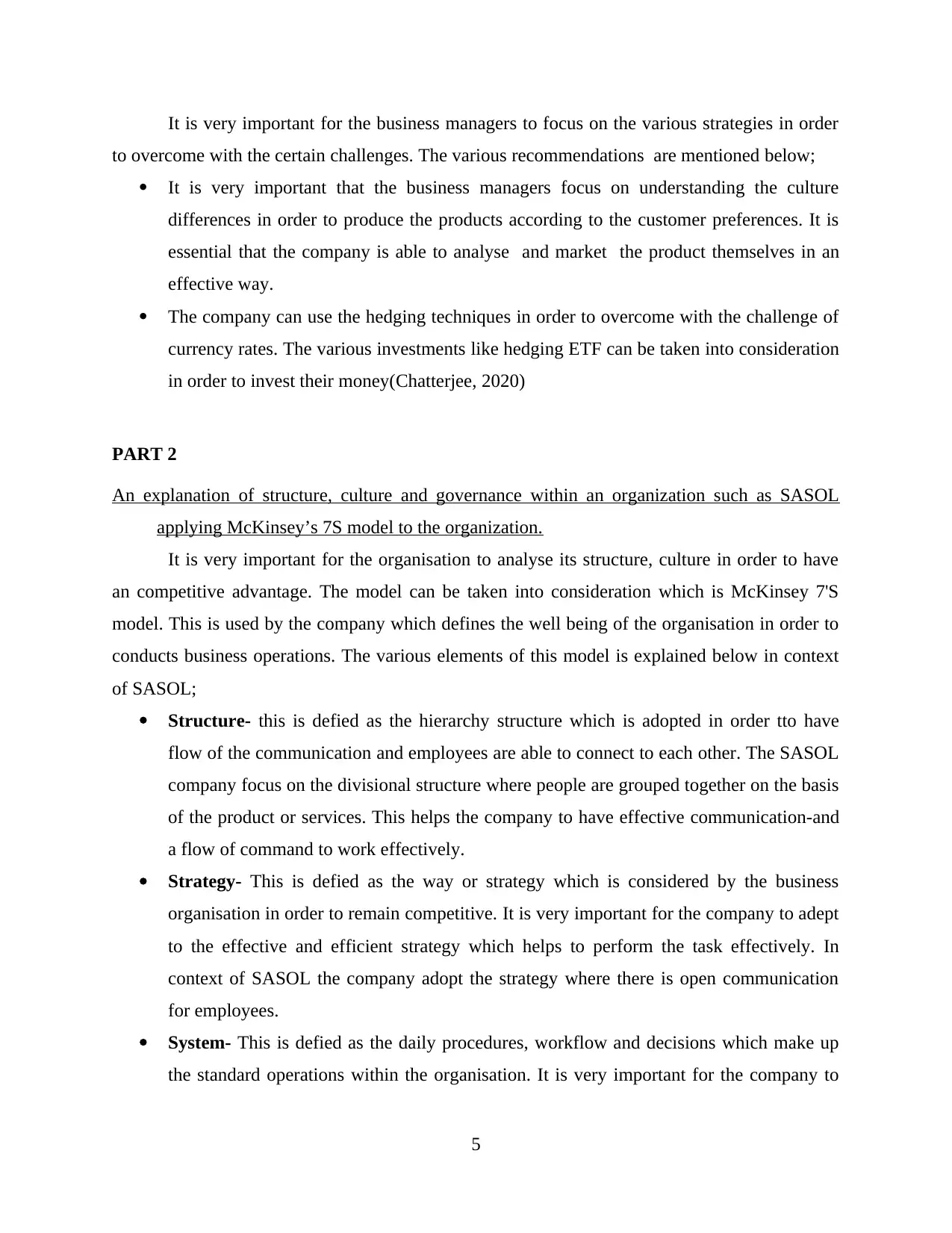
It is very important for the business managers to focus on the various strategies in order
to overcome with the certain challenges. The various recommendations are mentioned below;
It is very important that the business managers focus on understanding the culture
differences in order to produce the products according to the customer preferences. It is
essential that the company is able to analyse and market the product themselves in an
effective way.
The company can use the hedging techniques in order to overcome with the challenge of
currency rates. The various investments like hedging ETF can be taken into consideration
in order to invest their money(Chatterjee, 2020)
PART 2
An explanation of structure, culture and governance within an organization such as SASOL
applying McKinsey’s 7S model to the organization.
It is very important for the organisation to analyse its structure, culture in order to have
an competitive advantage. The model can be taken into consideration which is McKinsey 7'S
model. This is used by the company which defines the well being of the organisation in order to
conducts business operations. The various elements of this model is explained below in context
of SASOL;
Structure- this is defied as the hierarchy structure which is adopted in order tto have
flow of the communication and employees are able to connect to each other. The SASOL
company focus on the divisional structure where people are grouped together on the basis
of the product or services. This helps the company to have effective communication-and
a flow of command to work effectively.
Strategy- This is defied as the way or strategy which is considered by the business
organisation in order to remain competitive. It is very important for the company to adept
to the effective and efficient strategy which helps to perform the task effectively. In
context of SASOL the company adopt the strategy where there is open communication
for employees.
System- This is defied as the daily procedures, workflow and decisions which make up
the standard operations within the organisation. It is very important for the company to
5
to overcome with the certain challenges. The various recommendations are mentioned below;
It is very important that the business managers focus on understanding the culture
differences in order to produce the products according to the customer preferences. It is
essential that the company is able to analyse and market the product themselves in an
effective way.
The company can use the hedging techniques in order to overcome with the challenge of
currency rates. The various investments like hedging ETF can be taken into consideration
in order to invest their money(Chatterjee, 2020)
PART 2
An explanation of structure, culture and governance within an organization such as SASOL
applying McKinsey’s 7S model to the organization.
It is very important for the organisation to analyse its structure, culture in order to have
an competitive advantage. The model can be taken into consideration which is McKinsey 7'S
model. This is used by the company which defines the well being of the organisation in order to
conducts business operations. The various elements of this model is explained below in context
of SASOL;
Structure- this is defied as the hierarchy structure which is adopted in order tto have
flow of the communication and employees are able to connect to each other. The SASOL
company focus on the divisional structure where people are grouped together on the basis
of the product or services. This helps the company to have effective communication-and
a flow of command to work effectively.
Strategy- This is defied as the way or strategy which is considered by the business
organisation in order to remain competitive. It is very important for the company to adept
to the effective and efficient strategy which helps to perform the task effectively. In
context of SASOL the company adopt the strategy where there is open communication
for employees.
System- This is defied as the daily procedures, workflow and decisions which make up
the standard operations within the organisation. It is very important for the company to
5
Paraphrase This Document
Need a fresh take? Get an instant paraphrase of this document with our AI Paraphraser
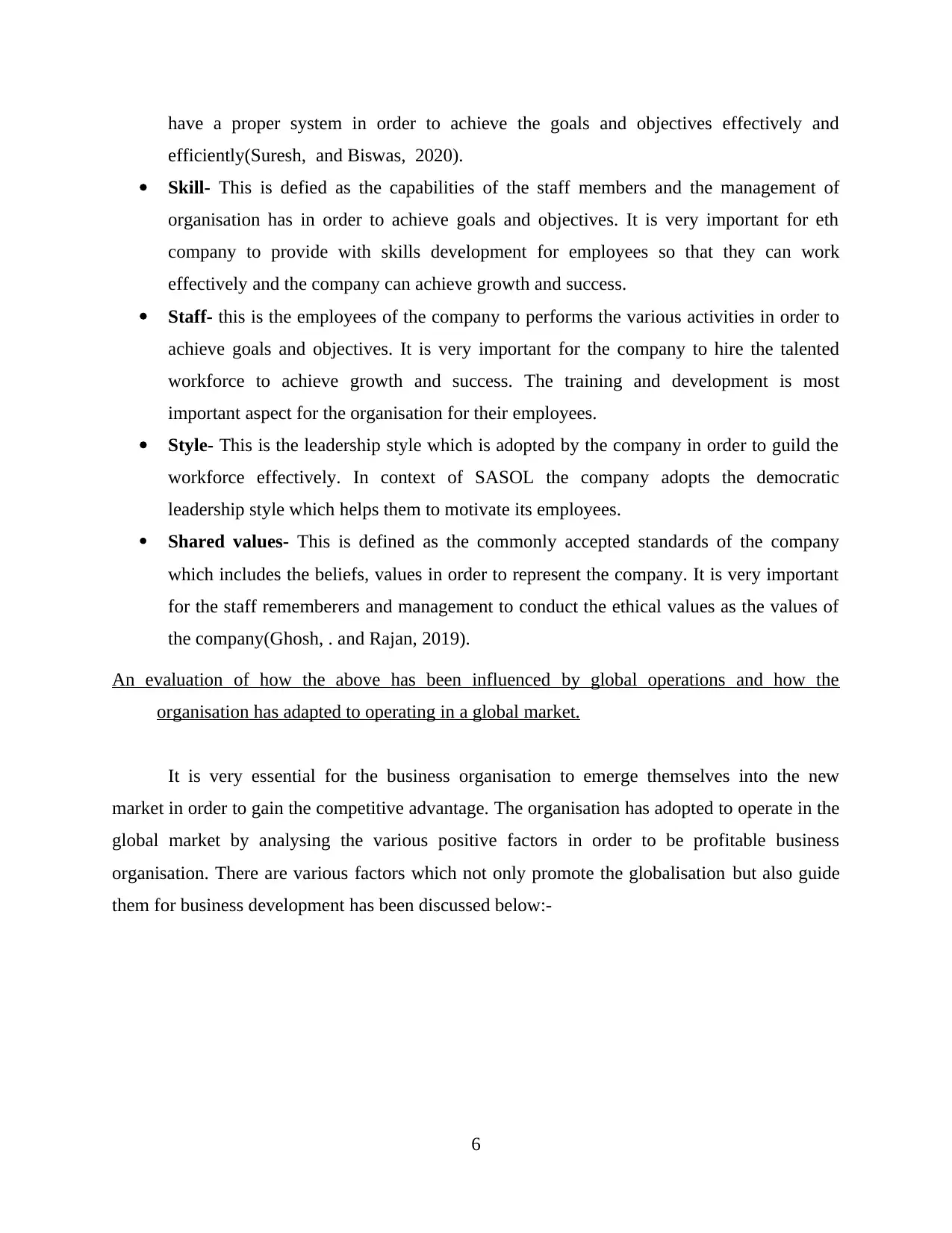
have a proper system in order to achieve the goals and objectives effectively and
efficiently(Suresh, and Biswas, 2020).
Skill- This is defied as the capabilities of the staff members and the management of
organisation has in order to achieve goals and objectives. It is very important for eth
company to provide with skills development for employees so that they can work
effectively and the company can achieve growth and success.
Staff- this is the employees of the company to performs the various activities in order to
achieve goals and objectives. It is very important for the company to hire the talented
workforce to achieve growth and success. The training and development is most
important aspect for the organisation for their employees.
Style- This is the leadership style which is adopted by the company in order to guild the
workforce effectively. In context of SASOL the company adopts the democratic
leadership style which helps them to motivate its employees.
Shared values- This is defined as the commonly accepted standards of the company
which includes the beliefs, values in order to represent the company. It is very important
for the staff rememberers and management to conduct the ethical values as the values of
the company(Ghosh, . and Rajan, 2019).
An evaluation of how the above has been influenced by global operations and how the
organisation has adapted to operating in a global market.
It is very essential for the business organisation to emerge themselves into the new
market in order to gain the competitive advantage. The organisation has adopted to operate in the
global market by analysing the various positive factors in order to be profitable business
organisation. There are various factors which not only promote the globalisation but also guide
them for business development has been discussed below:-
6
efficiently(Suresh, and Biswas, 2020).
Skill- This is defied as the capabilities of the staff members and the management of
organisation has in order to achieve goals and objectives. It is very important for eth
company to provide with skills development for employees so that they can work
effectively and the company can achieve growth and success.
Staff- this is the employees of the company to performs the various activities in order to
achieve goals and objectives. It is very important for the company to hire the talented
workforce to achieve growth and success. The training and development is most
important aspect for the organisation for their employees.
Style- This is the leadership style which is adopted by the company in order to guild the
workforce effectively. In context of SASOL the company adopts the democratic
leadership style which helps them to motivate its employees.
Shared values- This is defined as the commonly accepted standards of the company
which includes the beliefs, values in order to represent the company. It is very important
for the staff rememberers and management to conduct the ethical values as the values of
the company(Ghosh, . and Rajan, 2019).
An evaluation of how the above has been influenced by global operations and how the
organisation has adapted to operating in a global market.
It is very essential for the business organisation to emerge themselves into the new
market in order to gain the competitive advantage. The organisation has adopted to operate in the
global market by analysing the various positive factors in order to be profitable business
organisation. There are various factors which not only promote the globalisation but also guide
them for business development has been discussed below:-
6
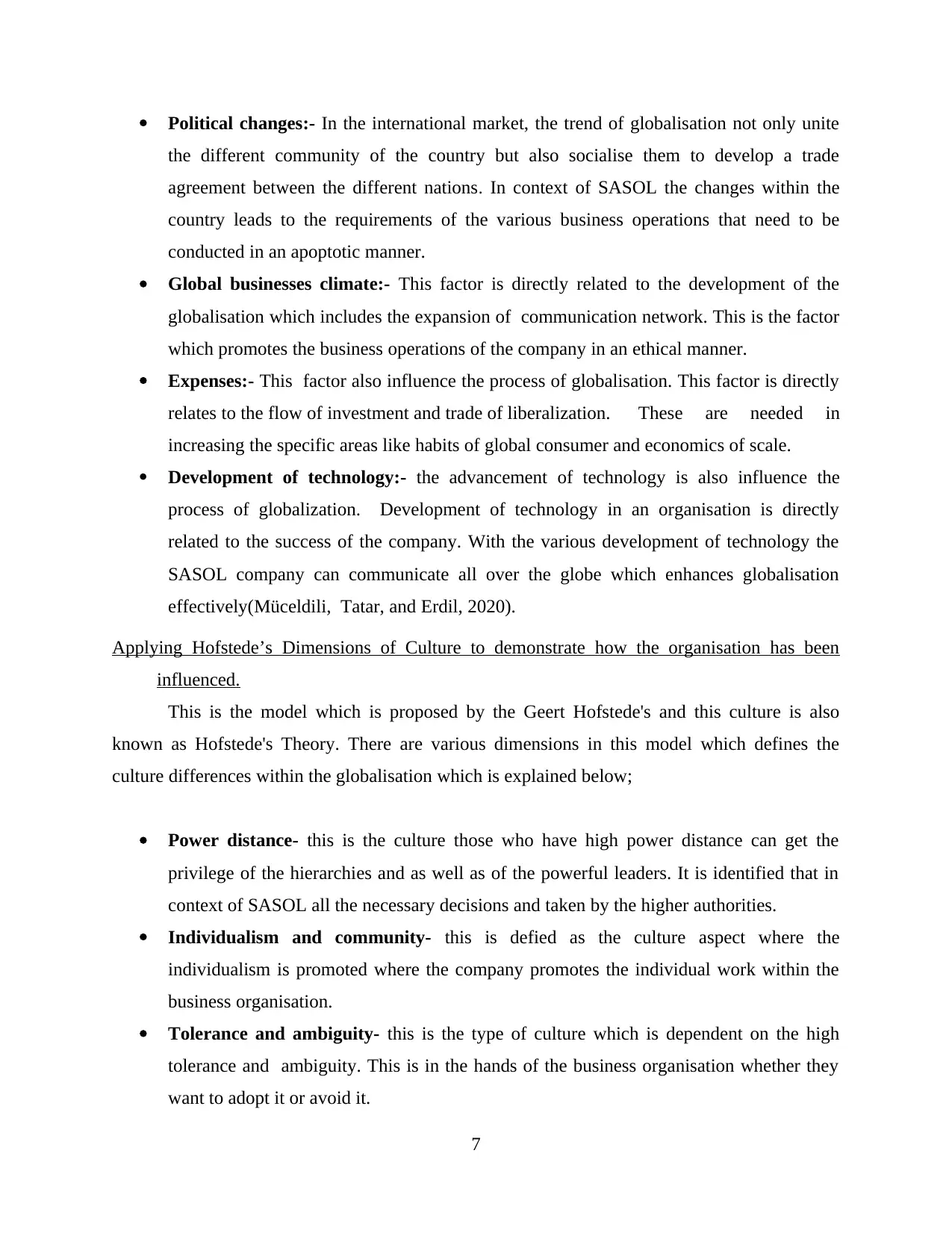
Political changes:- In the international market, the trend of globalisation not only unite
the different community of the country but also socialise them to develop a trade
agreement between the different nations. In context of SASOL the changes within the
country leads to the requirements of the various business operations that need to be
conducted in an apoptotic manner.
Global businesses climate:- This factor is directly related to the development of the
globalisation which includes the expansion of communication network. This is the factor
which promotes the business operations of the company in an ethical manner.
Expenses:- This factor also influence the process of globalisation. This factor is directly
relates to the flow of investment and trade of liberalization. These are needed in
increasing the specific areas like habits of global consumer and economics of scale.
Development of technology:- the advancement of technology is also influence the
process of globalization. Development of technology in an organisation is directly
related to the success of the company. With the various development of technology the
SASOL company can communicate all over the globe which enhances globalisation
effectively(Müceldili, Tatar, and Erdil, 2020).
Applying Hofstede’s Dimensions of Culture to demonstrate how the organisation has been
influenced.
This is the model which is proposed by the Geert Hofstede's and this culture is also
known as Hofstede's Theory. There are various dimensions in this model which defines the
culture differences within the globalisation which is explained below;
Power distance- this is the culture those who have high power distance can get the
privilege of the hierarchies and as well as of the powerful leaders. It is identified that in
context of SASOL all the necessary decisions and taken by the higher authorities.
Individualism and community- this is defied as the culture aspect where the
individualism is promoted where the company promotes the individual work within the
business organisation.
Tolerance and ambiguity- this is the type of culture which is dependent on the high
tolerance and ambiguity. This is in the hands of the business organisation whether they
want to adopt it or avoid it.
7
the different community of the country but also socialise them to develop a trade
agreement between the different nations. In context of SASOL the changes within the
country leads to the requirements of the various business operations that need to be
conducted in an apoptotic manner.
Global businesses climate:- This factor is directly related to the development of the
globalisation which includes the expansion of communication network. This is the factor
which promotes the business operations of the company in an ethical manner.
Expenses:- This factor also influence the process of globalisation. This factor is directly
relates to the flow of investment and trade of liberalization. These are needed in
increasing the specific areas like habits of global consumer and economics of scale.
Development of technology:- the advancement of technology is also influence the
process of globalization. Development of technology in an organisation is directly
related to the success of the company. With the various development of technology the
SASOL company can communicate all over the globe which enhances globalisation
effectively(Müceldili, Tatar, and Erdil, 2020).
Applying Hofstede’s Dimensions of Culture to demonstrate how the organisation has been
influenced.
This is the model which is proposed by the Geert Hofstede's and this culture is also
known as Hofstede's Theory. There are various dimensions in this model which defines the
culture differences within the globalisation which is explained below;
Power distance- this is the culture those who have high power distance can get the
privilege of the hierarchies and as well as of the powerful leaders. It is identified that in
context of SASOL all the necessary decisions and taken by the higher authorities.
Individualism and community- this is defied as the culture aspect where the
individualism is promoted where the company promotes the individual work within the
business organisation.
Tolerance and ambiguity- this is the type of culture which is dependent on the high
tolerance and ambiguity. This is in the hands of the business organisation whether they
want to adopt it or avoid it.
7
⊘ This is a preview!⊘
Do you want full access?
Subscribe today to unlock all pages.

Trusted by 1+ million students worldwide
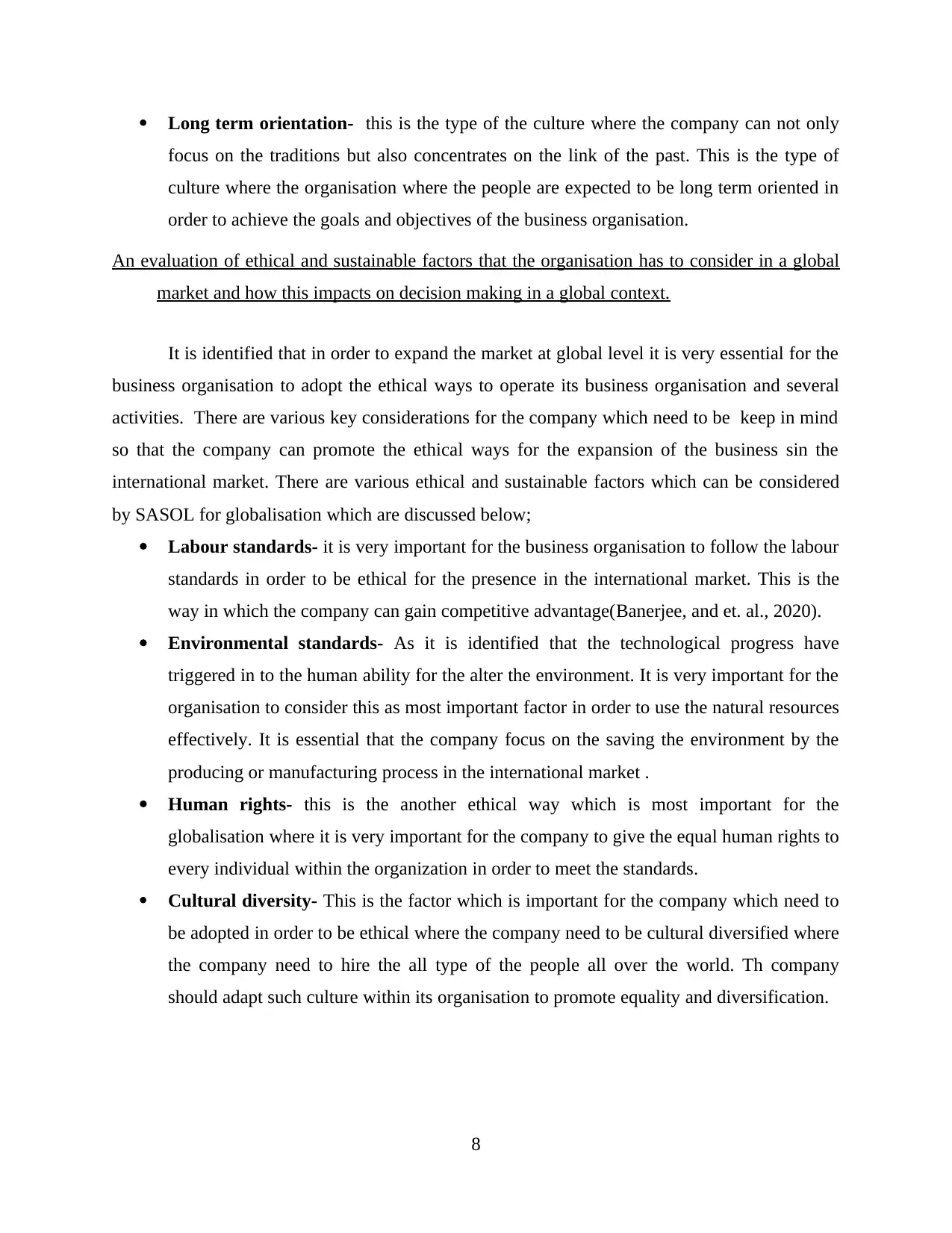
Long term orientation- this is the type of the culture where the company can not only
focus on the traditions but also concentrates on the link of the past. This is the type of
culture where the organisation where the people are expected to be long term oriented in
order to achieve the goals and objectives of the business organisation.
An evaluation of ethical and sustainable factors that the organisation has to consider in a global
market and how this impacts on decision making in a global context.
It is identified that in order to expand the market at global level it is very essential for the
business organisation to adopt the ethical ways to operate its business organisation and several
activities. There are various key considerations for the company which need to be keep in mind
so that the company can promote the ethical ways for the expansion of the business sin the
international market. There are various ethical and sustainable factors which can be considered
by SASOL for globalisation which are discussed below;
Labour standards- it is very important for the business organisation to follow the labour
standards in order to be ethical for the presence in the international market. This is the
way in which the company can gain competitive advantage(Banerjee, and et. al., 2020).
Environmental standards- As it is identified that the technological progress have
triggered in to the human ability for the alter the environment. It is very important for the
organisation to consider this as most important factor in order to use the natural resources
effectively. It is essential that the company focus on the saving the environment by the
producing or manufacturing process in the international market .
Human rights- this is the another ethical way which is most important for the
globalisation where it is very important for the company to give the equal human rights to
every individual within the organization in order to meet the standards.
Cultural diversity- This is the factor which is important for the company which need to
be adopted in order to be ethical where the company need to be cultural diversified where
the company need to hire the all type of the people all over the world. Th company
should adapt such culture within its organisation to promote equality and diversification.
8
focus on the traditions but also concentrates on the link of the past. This is the type of
culture where the organisation where the people are expected to be long term oriented in
order to achieve the goals and objectives of the business organisation.
An evaluation of ethical and sustainable factors that the organisation has to consider in a global
market and how this impacts on decision making in a global context.
It is identified that in order to expand the market at global level it is very essential for the
business organisation to adopt the ethical ways to operate its business organisation and several
activities. There are various key considerations for the company which need to be keep in mind
so that the company can promote the ethical ways for the expansion of the business sin the
international market. There are various ethical and sustainable factors which can be considered
by SASOL for globalisation which are discussed below;
Labour standards- it is very important for the business organisation to follow the labour
standards in order to be ethical for the presence in the international market. This is the
way in which the company can gain competitive advantage(Banerjee, and et. al., 2020).
Environmental standards- As it is identified that the technological progress have
triggered in to the human ability for the alter the environment. It is very important for the
organisation to consider this as most important factor in order to use the natural resources
effectively. It is essential that the company focus on the saving the environment by the
producing or manufacturing process in the international market .
Human rights- this is the another ethical way which is most important for the
globalisation where it is very important for the company to give the equal human rights to
every individual within the organization in order to meet the standards.
Cultural diversity- This is the factor which is important for the company which need to
be adopted in order to be ethical where the company need to be cultural diversified where
the company need to hire the all type of the people all over the world. Th company
should adapt such culture within its organisation to promote equality and diversification.
8
Paraphrase This Document
Need a fresh take? Get an instant paraphrase of this document with our AI Paraphraser
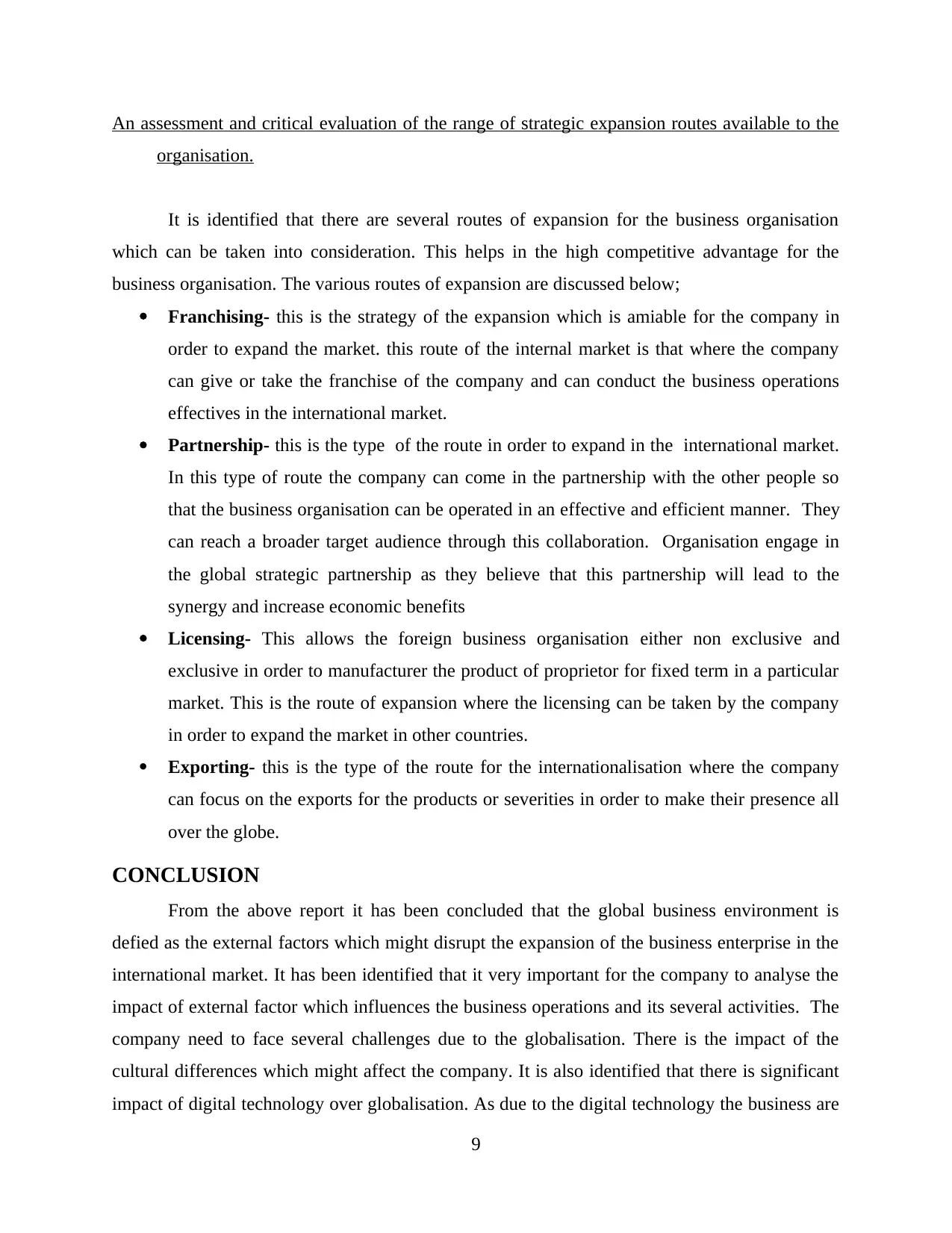
An assessment and critical evaluation of the range of strategic expansion routes available to the
organisation.
It is identified that there are several routes of expansion for the business organisation
which can be taken into consideration. This helps in the high competitive advantage for the
business organisation. The various routes of expansion are discussed below;
Franchising- this is the strategy of the expansion which is amiable for the company in
order to expand the market. this route of the internal market is that where the company
can give or take the franchise of the company and can conduct the business operations
effectives in the international market.
Partnership- this is the type of the route in order to expand in the international market.
In this type of route the company can come in the partnership with the other people so
that the business organisation can be operated in an effective and efficient manner. They
can reach a broader target audience through this collaboration. Organisation engage in
the global strategic partnership as they believe that this partnership will lead to the
synergy and increase economic benefits
Licensing- This allows the foreign business organisation either non exclusive and
exclusive in order to manufacturer the product of proprietor for fixed term in a particular
market. This is the route of expansion where the licensing can be taken by the company
in order to expand the market in other countries.
Exporting- this is the type of the route for the internationalisation where the company
can focus on the exports for the products or severities in order to make their presence all
over the globe.
CONCLUSION
From the above report it has been concluded that the global business environment is
defied as the external factors which might disrupt the expansion of the business enterprise in the
international market. It has been identified that it very important for the company to analyse the
impact of external factor which influences the business operations and its several activities. The
company need to face several challenges due to the globalisation. There is the impact of the
cultural differences which might affect the company. It is also identified that there is significant
impact of digital technology over globalisation. As due to the digital technology the business are
9
organisation.
It is identified that there are several routes of expansion for the business organisation
which can be taken into consideration. This helps in the high competitive advantage for the
business organisation. The various routes of expansion are discussed below;
Franchising- this is the strategy of the expansion which is amiable for the company in
order to expand the market. this route of the internal market is that where the company
can give or take the franchise of the company and can conduct the business operations
effectives in the international market.
Partnership- this is the type of the route in order to expand in the international market.
In this type of route the company can come in the partnership with the other people so
that the business organisation can be operated in an effective and efficient manner. They
can reach a broader target audience through this collaboration. Organisation engage in
the global strategic partnership as they believe that this partnership will lead to the
synergy and increase economic benefits
Licensing- This allows the foreign business organisation either non exclusive and
exclusive in order to manufacturer the product of proprietor for fixed term in a particular
market. This is the route of expansion where the licensing can be taken by the company
in order to expand the market in other countries.
Exporting- this is the type of the route for the internationalisation where the company
can focus on the exports for the products or severities in order to make their presence all
over the globe.
CONCLUSION
From the above report it has been concluded that the global business environment is
defied as the external factors which might disrupt the expansion of the business enterprise in the
international market. It has been identified that it very important for the company to analyse the
impact of external factor which influences the business operations and its several activities. The
company need to face several challenges due to the globalisation. There is the impact of the
cultural differences which might affect the company. It is also identified that there is significant
impact of digital technology over globalisation. As due to the digital technology the business are
9
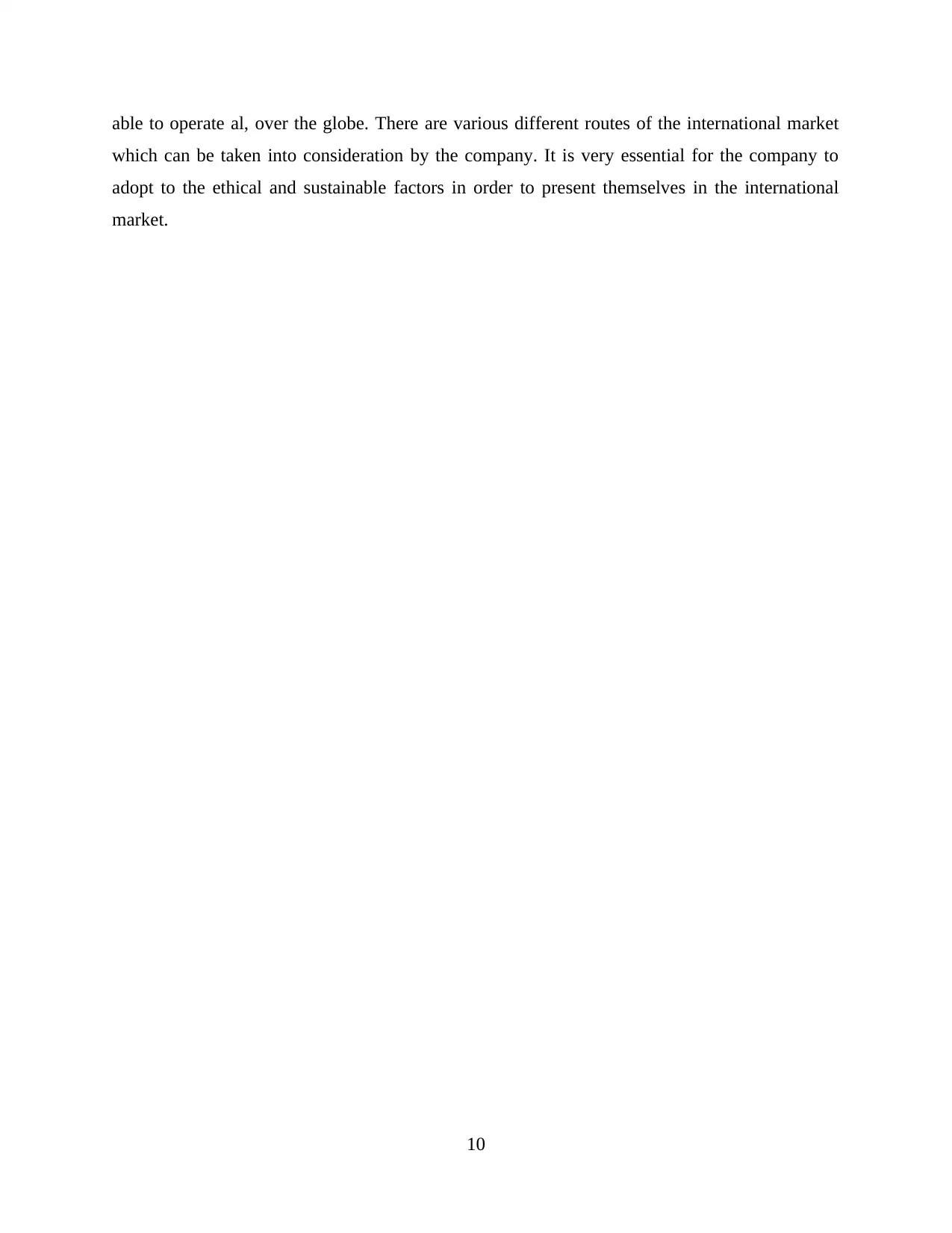
able to operate al, over the globe. There are various different routes of the international market
which can be taken into consideration by the company. It is very essential for the company to
adopt to the ethical and sustainable factors in order to present themselves in the international
market.
10
which can be taken into consideration by the company. It is very essential for the company to
adopt to the ethical and sustainable factors in order to present themselves in the international
market.
10
⊘ This is a preview!⊘
Do you want full access?
Subscribe today to unlock all pages.

Trusted by 1+ million students worldwide
1 out of 13
Related Documents
Your All-in-One AI-Powered Toolkit for Academic Success.
+13062052269
info@desklib.com
Available 24*7 on WhatsApp / Email
![[object Object]](/_next/static/media/star-bottom.7253800d.svg)
Unlock your academic potential
Copyright © 2020–2026 A2Z Services. All Rights Reserved. Developed and managed by ZUCOL.



